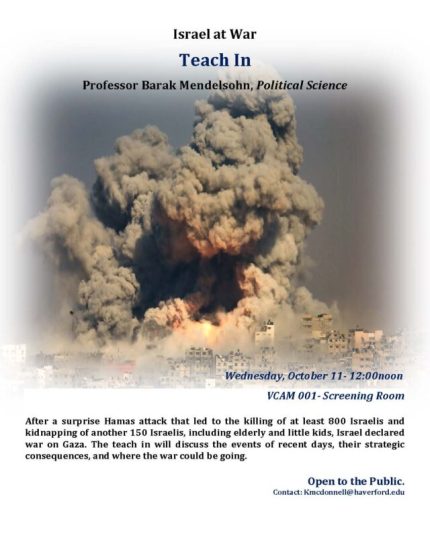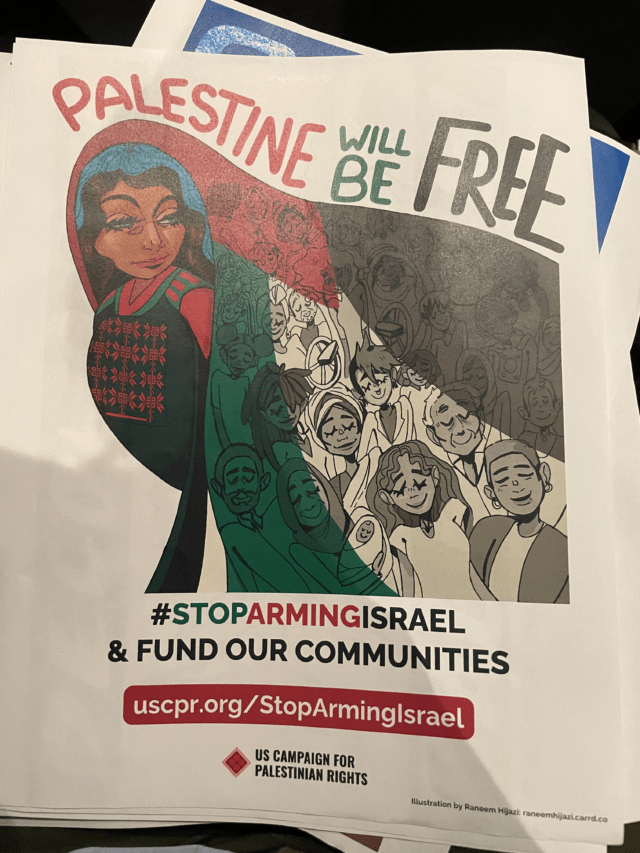By: Jonathan Kevorkian and Zhao Gu Gammage
Yesterday, in a theater so packed that people were sitting on the floor, political science professor Barak Mendelsohn addressed the audience of over 70 students, administrators, and community members: “I stand in front of you as an academic; I will not be going to make any moral judgments, just a strategic analysis meant to inform.”
Only three days after the attack, Mendelsohn hosted a teach-in in the VCAM screening room to educate members of the public about the ongoing conflict. “l wanted to do something now because timing is important,” Mendelsohn shares. The campus goes on fall break tomorrow.
The promotion for the talk, which was shared via a mass email, described Sunday’s event as a “surprise attack that led to the killing of at least 800 Israelis and kidnapping of another 150 Israelis, including elderly and little kids” and was accompanied by a picture of a bombing. Some students viewed this poster as unbalanced due to the evocative nature of the visual and wording.

Mendelsohn, who has taught at Haverford since 2008, has extensively researched international security and the Middle East. This semester, his coursework includes the impact that security policies and theories have on interstate conflicts, war, and peaceful resolution. His scholarship includes an analysis of the terrorist organization Hamas and international conflict in Gaza.
He grew up in Israel and received higher education there, graduating with a Bachelor’s in Jerusalem and Middle Eastern Studies from Hebrew University and a Master’s in Security Studies from Tel Aviv University. He considers himself secularly Jewish and has served in the Israeli Defense Forces (the Israeli military exempts Arab citizens who are Muslim or Christian from compulsory service).
Mendelsohn started by contextualizing the age demographic in Gaza, noting that approximately 65% of Gazans are under 25 and that the conflict will remain vivid in the memories of the population. He continued by stating the main instances of conflict in Palestine, the most recent being Israeli air strikes on Gaza in May of 2023.
After providing context for the present war, he delved into how the attack unfolded, with approximately 1,500 members of Hamas breaching protective fences in 30 different positions and advancing as far as 20 kilometers past the barricades.
As Professor Mendelsohn explained, these attacks were in response to Israeli settlers moving into Palestinian land and forming encampments. Over a thousand people have been killed, with hundreds taken hostage and bombing campaigns from both sides underway.
From here, Mendelsohn ventured towards United States involvement and where he viewed the war could be heading. He noted that domestically, Israel had formed an emergency government with multiple coalitions coming together.
On the international front, Professor Mendelsohn claimed that while Israel had “found comfort and leadership” in President Joe Biden, it would most likely come with strings attached, such as having the Israeli government treat Palestinians better in the future.
However, he emphasized that “We don’t know what Hamas really [wants] to achieve”, a reminder that predictions of the future are merely speculation, and not indicative of what will occur.
Mendelsohn asserted that while “you can perhaps destroy Hamas as an organization, you cannot suppress the Islamic movement. Islamism will always be a part of the Gaza Strip.” This is key, as no matter the end result of this conflict, there will always be disputes regarding land and religion, as no solution will be acceptable to every person.
After speaking for an hour, he opened up the floor for questions. The first question related to migration, specifically the student inquired as to why he claimed that Hamas is creating the refugee crisis despite Israel launching the attack. Mendelsohn disputes the framing of the question, asserting that this was not a claim he made.


Later, a question was asked about the differences in religion between Israel, Palestine, and the greater Middle East, and how it influenced the start of the war. The question also probes how religion could help to end the war and form new geopolitical coalitions, with a potential Saudi-Israeli peace deal being cited as an example. In his answer, he noted that religious extremism can be found on both sides of the conflict.
Despite the tensions arising from the question and answer section, students found the talk to be beneficial to generate campus-wide conversation. While questions were being asked, posters promoting the liberation of Palestine were passed around. As tensions escalated, two Campus Safety officers waited outside of the theater after the talk.
“I think the whole question and not taking statements can be really hard, especially in a talk where people are really passionate about what’s going on, but I thought it was good conversation and l think it was good the campus had it,” remarked senior Jorge Paz Reyes.
First-year Andrej Coleman commented that “l don’t have a ton of knowledge on it, but it was definitely insightful since it’s hard for me to get straight talk from the news because they already assume you know a lot of stuff.”
As audience members were exiting, students from Students for Justice in Palestine were passing out pamphlets and posters.



“We are ahead of very dark days,” Mendelsohn warns, but he remains hopeful that the US can help dissolve the tensions, stating “The US has the tools to hopefully shape what’s going to happen after, and l do hope the US will use those tools to try to promote peace.”
Correction: This article originally stated that all Israeli citizens are required to serve in the IDF. This is not true. The Clerk deeply regrets the error.






I think it is important to add that in addition to members from Students for Justice in Palestine, members of Jewish Voices for Peace were also passing out fliers and pamphlets. As Jews, we will not stand by genocide being carried out in our name.
https://www.instagram.com/p/CyHIJs3AArY/?igshid=MzRlODBiNWFlZA==
Other materials we passed out to contextualize these events as an outcome of decades and to show that we need to be supporting Palestinians as they face intense escalation of Israeli violence through mass starvation and murder, millions of people being forced to relocate, not allowing people to leave, bombings, and wiping out entire neighborhoods:
https://docs.google.com/document/d/18kU13mSzGBI1Lz2H6M114eQiz01Wase9TRJb_qL4paE/edit
https://www.instagram.com/p/CRRck70tLNE/?igshid=MzRlODBiNWFlZA==
https://www.instagram.com/p/Cf4LbParUSU/?igshid=MzRlODBiNWFlZA==
https://www.instagram.com/p/CdlluZwtSJI/?igshid=MzRlODBiNWFlZA==
https://www.instagram.com/p/CTxGVd6NcXr/?igshid=MzRlODBiNWFlZA==
Correction: decades of colonization
Other materials we passed out to contextualize these events as an outcome of decades of colonization and to show that we need to be supporting Palestinians as they face intense escalation of Israeli violence through mass starvation and murder, millions of people being forced to relocate, not being allowed to leave, bombings, and wiping out entire neighborhoods:
https://docs.google.com/document/d/18kU13mSzGBI1Lz2H6M114eQiz01Wase9TRJb_qL4paE/edit
https://www.instagram.com/p/CRRck70tLNE/?igshid=MzRlODBiNWFlZA==
https://www.instagram.com/p/Cf4LbParUSU/?igshid=MzRlODBiNWFlZA==
https://www.instagram.com/p/CdlluZwtSJI/?igshid=MzRlODBiNWFlZA==
https://www.instagram.com/p/CTxGVd6NcXr/?igshid=MzRlODBiNWFlZA==
I realized I accidentally copied the links wrong. My apologies. Here are the corrected links:
https://docs.google.com/document/d/18kU13mSzGBI1Lz2H6M114eQiz01Wase9TRJb_qL4paE/edit
https://www.instagram.com/p/CRRck70tLNE/?igshid=MzRlODBiNWFlZA==
https://www.instagram.com/p/Cf4LbParUSU/?igshid=MzRlODBiNWFlZA==
https://www.instagram.com/p/CdlluZwtSJI/?igshid=MzRlODBiNWFlZA==
https://www.instagram.com/p/CTxGVd6NcXr/?igshid=MzRlODBiNWFlZA==
“Mendelsohn asserted that while ‘you can perhaps destroy Hamas as an organization, you cannot suppress the Islamic movement. Islamism will always be a part of the Gaza Strip.'”
Is this an actual, direct quote from Prof. Meldelsohn? If so, I’m disturbed by how flagrantly islamophobic it is, as it seemingly correlates Hamas and Islamism. Hamas ≠ Islamism, just as Zionism ≠ Judaism (the Lakota Law Project’s statement on the conflict offers a very nuanced overview of the Jewish diaspora and Zionism for those wanting to learn more). Disappointed that such a dangerous idea wasn’t held in check.
While I don’t wish to tokenize anyone or put labor on someone, I hope faculty will offer a similar event from a decolonial, free Palestine perspective.
Islamism is not the same as Islam. Islamism is a relatively recent political ideology that seeks to make Islam the dominant political force in the world. Hamas, the Taliban, Al-Qaeda, and the Wahabism are examples of Islamist movements, however, not all Muslims or Islamic organizations are Islamist. For more info see https://en.wikipedia.org/wiki/Islamism